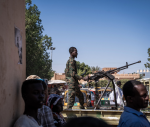You are here
Ideas in modernisation
Mar 15,2023 - Last updated at Mar 15,2023
We are fully aware that the government is facing great challenges and its options are limited, and it is sometimes forced to adopt the option that is accompanied by the least harm. Yes, the challenges are complex and overlapping, but solutions are possible at the same time despite the difficulties. We appreciate the government’s efforts to advance and develop the country, and we wish it success for the good of the country and the people.
Out of a sense of common responsibility shared by all, I would like to put forward some ideas in modernisation, in which the government may find something useful:
First: Multidimensional diagnosis and comprehensive analysis of the national situation, which leads to integrated, permanent, balanced solutions that control trends, rhythm and direct public action, which doubles output. In addition to adopting comprehensive solutions that take into account all dimensions and issues, and refraining from adopting unilateral solutions in isolation from the overall picture and the general context, and enhancing investor trust in the investment environment and relative stability in legislation and policies, and ensuring the relative low cost of products, which increases their competitiveness in various markets, and thus the volume of economic activities increases and increases employment opportunities and state revenues.
Second: Electronic and digital transformation is an inevitable necessity, not only in the field of services, but also in internal systems, procedures and databases.
Third: Transportation is the basis of development. It is important to link the Kingdom with an “express train” railway with specific stations, from north Irbid to the University of Science and Technology, to Mafraq, to Al al-Bayt University, to the Hashemite University, to the east of Zarqa, to the east of Amman, to its south, to the airport, and from there in the future to the entrance of Karak to the entrance of Tafileh to the entrance of Maan to Aqaba and from there in the future to Wadi Araba to the southern valleys, then the middle, then the northern. There is nothing wrong with the infrastructure being through a foreign investment for several years that will eventually be owned by the state.
Fourth: Focusing on priorities with a competitive advantage and relatively high added value, especially tourism, medical tourism, education, food security, technology, logistics and supply chains.
Fifth: Social Security. Directing the investments of social security funds to areas that have a multiplier effect on the economy in terms of generating job opportunities and operating the productive and service sectors. In addition, stopping the participation of expatriate workers, with all appreciation for them, in social security, just like many countries in the world, because the vast majority of them apply the concept of “risky professions” and early retirement, and this is costly on the security, as the disbursement of pension salaries extends for many years. In addition, it is spent outside the country, and therefore the economy does not benefit from it.
Sixth: The general budget. The financing budget, in its two parts, sources and uses, are no less important than the expenditure budget, and the item “interest on public debt” differs in nature from the rest of the current expenditure items, and the “grants” item differs from the rest of the revenue items, and the need to distinguish in the budget of the Ministry of Finance in terms of powers and analysis between the budget items (expenditures and revenues) at the state level and the ministry’s budget like any other ministry. Capital budgets must be purified from any current expenditures.
Seventh: Controlling spending. Social security is a substitute for all types of retirement and retirement funds, including union pension funds, and in exchange for that, investment funds are maintained. Moreover, stopping allocating government cars for all categories, as well as stopping allocating cars at the expense of government-owned companies and the Social Security Corporation for whoever, in addition to controlling and rationing privileges. This is in addition to health insurance governance and simultaneous advance control of the medical treatment bill.
Eighth: Performance follow-up. Enhancing follow-up and accountability, as most of the defects are in practice and application, and activating administrative oversight and performance oversight. This is in addition to following up on achieving the sustainable development goals and improving Jordan’s grading and ranking in international indicators.
Ninth: Immunising the authorities. The Ministry of Justice undertakes the tasks of administrative and financial affairs, procurement and supplies for the courts, and the employees working in the courts are employees of the ministry. The purpose of all this is so that the judicial authority is not subject to the accountability of the Audit Bureau. This matter is supposed to apply necessarily and for the same purpose to Parliament, in its two parts, senators and the representatives. This is so that the ministry concerned with parliamentary affairs takes over the administrative and financial affairs and supplies in Parliament, and that the employees working in Parliament are employees of the ministry. In this way, the authorities also devote themselves to competence.
Tenth: The common motive of all authorities and institutions is to strengthen Jordan’s position on the global map economically, as is the case politically, and within the scope of roles determined by the Constitution.













